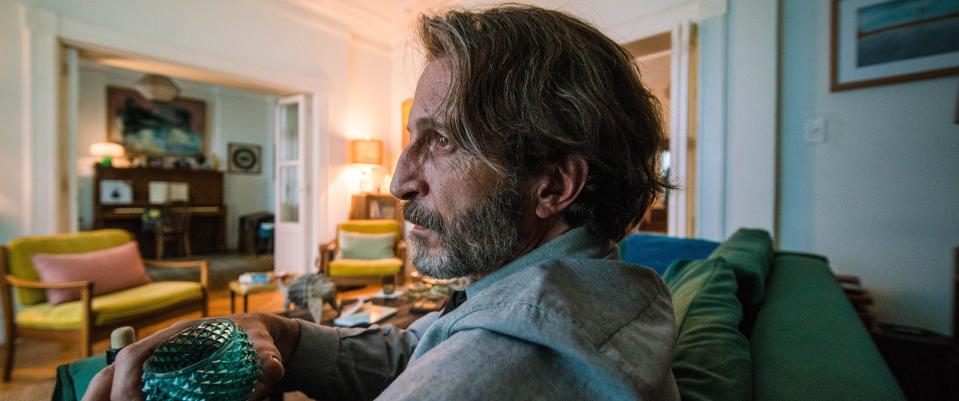'Bardo,' Alejandro Iñárritu’s new movie, may drive you crazy. Let it. You won't be sorry
- Oops!Something went wrong.Please try again later.
For whatever reason, there have been a slew of at least semi-autobiographical films lately, such as Steven Spielberg’s “The Fabelmans” and James Gray’s “Armageddon Time.”
They are intensely personal projects by definition, but beyond that they don’t have much in common.
“Bardo: False Chronicle of a Handful of Truths” has even less in common with the others — or with many other films, for that matter. Alejandro G. Iñárritu’s new film certainly has nods to movies like Fellini’s “8 1/2” in its unconventional look at the life of an artist. But it’s definitely its own thing, a puzzle that perhaps only Iñárritu himself can crack.
It is intermittently thrilling to try.
Review:'The Binge 2: It's a Wonderful Binge' isn't too stupid. It's not stupid enough
'Bardo' is boring, too long and self-indulgent. It's also beautiful and moving
It’s also at times boring, way too long (at 2 hours and 39 minutes, it’s actually been trimmed from its original length) and so self-indulgent it would make Donald Trump say, “You know, that’s a bit much.”
It’s also intensely beautiful, unfailingly creative and every now and then genuinely moving. You just have to be willing to separate the wheat from the chaff, which may be more effort than some viewers are willing to invest.
Yes, “viewers,” not “audience.” “Bardo” begins streaming on Netflix on Dec. 16. I’d love to see the numbers on how many people watch it all the way through.
That’s the way to do it, though. For films like this, you have to immerse yourself in them fully to even have a hope of getting the most out of them.
Silverio Gama (Daniel Giménez Cacho) is a journalist and documentarian who is about to receive a major journalism award in Los Angeles, his home for 20 years. He returns to his original home of Mexico first, and there faces jealousy, fleeting imposter syndrome, accusations of being a fraud and his own ambivalence about his life and work.
(For those keeping score, Iñárritu is from Mexico, and has won four Oscars, including two for best director.)
Silverio will also revisit his past, as well as his complicated relationship with his home country. It’s a swirling mass of ideas swimming around in Silverio’s head and in his soul, which Iñárritu tries to capture on film. Sometimes it works, sometimes it doesn’t.
Early in the film Silverio waits for the birth of his son, Mateo. Mateo doesn’t live long, and his death haunts Silverio and his family, as well as the film. The surreal nature of the scene sets the tone right off the bat.
As does a curious seduction scene between Silverio and his wife Lucía (Griselda Siciliani). Later, sometimes intense discussions with his son Lorenzo (Íker Sánchez Solano) and daughter Camila (Ximena Lamadrid) are more straightforward, and revealing.
Review:Sure, 'Violent Night' is, well, violent. It's also kind of sweet
Occasionally Iñárritu reminds us that he's not all flash and technique
In Tibetan Buddhism, bardo is a place between life and death. One supposes that it might be an appropriate place to take stock of one’s life — and that this consideration might play out in weird and at times incomprehensible scenes.
So it is with “Bardo.” Mexican journalists, teeming with envy, throw a huge party for Silverio, who has no taste for the spotlight, or for defending his work from detractors. During a massive dance number, David Bowie’s isolated vocals for “Let’s Dance” are key to the jaw-dropping set piece.

At the same party, Luis (Francisco Rubio), the host of a popular Mexican TV show with whom Silverio used to work, confronts him. His words dripping acid, he dresses Silverio and his work down in ways that could also be used to criticize “Bardo” — it’s as if Iñárritu is saying, I know what you’re thinking.
And then Silverio responds in kind, with a finishing flourish that filmmakers no doubt wish could play out in real life.
It’s all showy and big and loud. But the most moving scene takes place on a beach, empty except for Silverio and his family. They say little, if anything. Their actions, on the other hand, speak volumes.
It’s a reminder that Iñárritu isn’t all flash and technique. There is some heart in “Bardo.” You just have to be willing to find it.
Review:Jenna Ortega will make 'Wednesday,' an Addams Family spinoff, your favorite day
'Bardo' 3 stars
Great ★★★★★ Good ★★★★
Fair ★★★ Bad ★★ Bomb ★
Director: Alejandro G. Iñárritu.
Cast: Daniel Giménez Cacho, Griselda Siciliani, Íker Sánchez Solano.
Rating: R for strong racial violence, disturbing images and language.
How to watch: Streaming on Netflix starting Dec. 16.
Reach Goodykoontz at bill.goodykoontz@arizonarepublic.com. Facebook: facebook.com/GoodyOnFilm. Twitter: @goodyk. Subscribe to the weekly movies newsletter.
Subscribe to azcentral.com today. What are you waiting for?
This article originally appeared on Arizona Republic: 'Bardo': Alejandro G. Iñárritu's latest movie is weird, worthy

